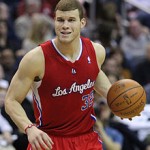If you enjoy the weekly StatBox column that analytically breaks down some of the NBA’s most pressing and important topic, you’re in luck. Every Tuesday through Thursday during the postseason, the StatBox is expanding into playoff game analysis. You’ll not only find out why each team won and lost, but how different statistical trends can play out over the course of the series and the playoffs as a whole. First up: why the Bulls and Clippers are looking good in their quests to advance.
 Noah Leads Bulls Defense To Series Equalizer
Noah Leads Bulls Defense To Series Equalizer
If you think of the hallmark of this season’s Tom Thibodeau-led Chicago Bulls team, you clearly think of the defensive side of the ball. And the team’s top defender all year has been one Joakim Noah, who was instrumental in helping the Bulls become the first road team to win a playoff game this postseason.
No Bulls player had more defensive win shares during the regular than Joakim Noah’s 4.7, which tied him for eighth along with LeBron James, Zach Randolph and David West. So it should come as no surprise that Chicago played much better defensively in its 90-82 Game 2 win over the Nets after a terrible defensive performance on Saturday night.
Noah played 13 minutes in Game 1 and 25 minutes in Game 2, and his presence in the paint was a major reason why Brooklyn’s frontcourt struggled so mightily on Monday evening. First take a look at how all the Nets’ frontcourt players did in Game 1 when Noah’s minutes were limited:
| Game 1 | FG % | Points | FTA | Rebounds | Blocks |
| Lopez | 0.47 | 21 | 7 | 5 | 3 |
| Wallace | 0.71 | 14 | 5 | 6 | 2 |
| Evans | 0.67 | 5 | 2 | 13 | 0 |
| Blatche | 0.55 | 12 | 0 | 3 | 0 |
| Humphries | 0.5 | 2 | 0 | 1 | 0 |
| Others | 0 | 0 | 0 | 4 | 0 |
| Totals | 0.5 | 54 | 14 | 32 | 5 |
The players shot a combined 15-of-30 with 32 rebounds, while Chicago as a team only grabbed 35 boards on Saturday night. Noah got five of those in just a 13-minute span. Double Noah’s minutes for Game 2, and the difference is remarkable:
| Game 2 | FG % | Points | FTA | Rebounds | Blocks |
| Lopez | 0.50 | 21 | 8 | 5 | 3 |
| Wallace | 0.14 | 2 | 0 | 3 | 0 |
| Evans | 0.67 | 4 | 0 | 8 | 2 |
| Blatche | 0.44 | 8 | 0 | 7 | 0 |
| Humphries | 0.43 | 8 | 2 | 5 | 0 |
| Others | 0.2 | 4 | 2 | 0 | 0 |
| Totals | 0.4 | 47 | 12 | 28 | 5 |
The Brooklyn forwards and centers went 18-of-45 in game two, shooting it exactly 10 percent worse than they did in the first game on 15 more field goal attempts. That improvement also manifested itself with the Nets’ backcourt stars, as Deron Williams and Joe Johnson shot a combined 7-for-27 (3-of-12 from three) as the team shot 35.4 percent from the field and 4-for-21 from three.
Saying that Noah’s iffy foot is the key to this series is obviously oversimplifying things, but it’s nearly impossible to ignore the impact he made on not just this game, but on the momentum of the series as the focus shifts to Chicago.
 Two Key Factors In The Clippers’ Quick Start
Two Key Factors In The Clippers’ Quick Start
Memphis has four of the top defenders in the league in Mike Conley, Tony Allen, Marc Gasol and Zach Randolph. They were essentially given the task of containing three Clippers players: Chris Paul, Blake Griffin and Jamal Crawford. Their inability to curtail the production of any of the L.A. trio is a major reason why the Grizzlies are in a 2-0 hole going back east.
1) Memphis can’t stop L.A.’s top two players
Last week’s StatBox column discussed the key players for each playoff team, and Griffin and Allen were chosen as the key guys in this series. Griffin had faired poorly in four games against Memphis, but came up really big against an extremely good Grizzlies front line in game two.
| Griffin | FG % | Points | Rebounds |
| Regular Season | 44.4 | 13.8 | 7 |
| Game 1 | 33 | 10 | 5 |
| Game 2 | 50 | 21 | 8 |
Whatever happened between the first two games, the light turned on for Griffin and he came up huge in what could prove to be the contest that swung the proverbial pendulum of this series squarely in Los Angeles’ favor. Allen and Conley were tasked with containing Chris Paul, but, as some writers have pointed out, it seems like Paul has another “gear” in the postseason.
well, the author loves advanced stats. Advanced stats via hollinger is what got Gay moved to toronto for davis and prince. Bad trade and you saw why last night. The very things stats cant tell you. Gay is unpredictable, LONG, and disruptive. Memphis is still a very good defensive team over all, but they have to play harder to maintain that level on defense because losing Gay means total predictability on offense. Also they traded ellington and speights. Now ellington was a bad defender but he hit a lot of 3s. Speights however is sorely missed. They gutted the bench. Traded the one big creative offensive force. They now will lose.